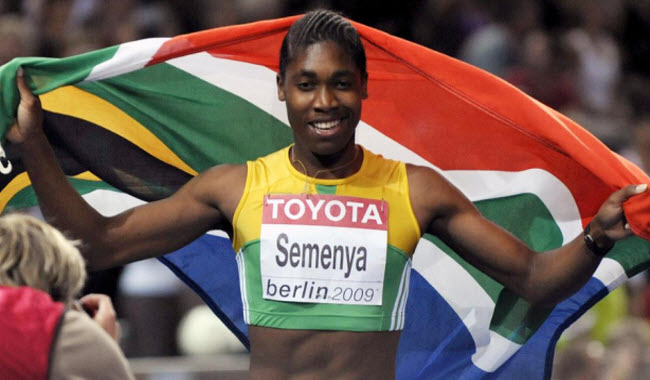One of the major issues facing track and field athletics is the use of performance-enhancing drugs. Such substances can help athletes exert more effort and win competitions, thus undermining the principle of fair play. However, today another pressing issue has emerged in the sport—gender identity. Suspicions have been raised about several female athletes who break records that are physiologically difficult for women to achieve. Among the most prominent athletes facing these allegations is South African runner Caster Semenya, who has won two Olympic gold medals and three World Championships in the 800 meters. It was later discovered that she is intersex, possessing high levels of testosterone due to internal testes, which has led to legal battles with the sport’s governing bodies.
Early Life and Career:
Born in 1991 in a village in South Africa, Caster Semenya grew up in a family with four siblings. She enrolled in university as a sports science student and initially trained for soccer before switching to track and field. She first competed in the 800 meters at the World Junior Championships in 2008 but did not advance to the finals. That same year, she won a gold medal in the Commonwealth Youth Games and later that year won the gold medal in the 800 meters at the World Championships. By December of that year, she was voted as the best female 800-meter runner.

Controversy and Tests:
After her World Championships victory, questions arose about Semenya’s gender, especially since her 800 meters time was four seconds faster than her previous record from the African Junior Championships just a month prior. Her improved and rapid performance prompted the International Association of Athletics Federations (IAAF) to request a gender verification test to confirm her female status. Although the results were never officially released, leaks to the media led to widespread speculation that Semenya was intersex and had internal testes producing high levels of testosterone. In November 2009, the South African Sports Ministry announced an agreement with the IAAF to retain her medals and awards. By July 2010, she was cleared and returned to women’s competitions.
Global Reactions and Support:
The IAAF’s handling of the case sparked significant backlash. Many athletes, including retired sprinter Michael Johnson, criticized the organization for its approach. South Africa’s reaction suggested possible racial undertones, with local media reports questioning the legitimacy of the tests and alleging that Europeans did not want South African athletes to excel. The IAAF defended its actions, stating that the gender verification test was conducted after the media had already published news about the issue. The organization denied any racial motivations and expressed regret over accusations of discrimination. The intent, they argued, was not to accuse Semenya of cheating but to determine if she had a rare medical condition giving her an unfair advantage.

Legal and Athletic Career Developments:
Semenya received substantial support from her country, with prominent South African leaders, commentators, and activists condemning the controversy as racist and a violation of her privacy and human rights. Semenya herself stated in an interview with a South African magazine, “God made me who I am, and I accept myself as I am.” Despite this support, she was denied the opportunity to compete in a local competition in March 2010 due to the pending results of her gender test. However, on July 6, she was allowed to return to international competition, and she won two minor races in Finland shortly after. She also won the World Championships in August.
Olympic Achievements and Controversies:
In honor of her achievements, Semenya was chosen to carry the South African flag during the opening ceremony of the 2012 Summer Olympics, where she won a silver medal in the 800 meters behind Russian athlete Maria Savinova, who later faced a lifetime ban for doping violations in November 2015. This resulted in Semenya being upgraded to gold. That year, the IAAF suspended its policy on hyperandrogenism, or high testosterone levels in women, which had been in place since 2011. The ruling stated that there was insufficient evidence proving that testosterone levels directly enhanced athletic performance, giving the IAAF two years to provide proof.

Recent Developments:
By April 2016, Semenya became the first athlete to win all three titles—400 meters, 800 meters, and 1500 meters—at the South African National Championships, setting a new national record in the 800 meters. On August 20, she won the gold medal in the 800 meters at the Rio de Janeiro Olympics, reigniting debate over testosterone regulations. In 2017, she won a bronze medal in the 1500 meters and gold in the 800 meters at the World Championships in London.

In April 2018, the IAAF introduced new rules requiring athletes with certain intersex conditions causing elevated testosterone levels to take medication to lower their levels to compete in female categories. The regulations specifically targeted events such as the 400 meters, 800 meters, and 1500 meters, which Semenya regularly competes in. This led many to believe that the rule change was designed to target her specifically. In June, Semenya announced she would challenge the IAAF’s rules, claiming that the hormonal medications she took from 2010 to 2015 made her feel unwell and caused abdominal pain. In May 2019, the Court of Arbitration for Sport rejected her appeal, paving the way for the new regulations to come into effect. Semenya appealed to the Swiss Federal Supreme Court, which ultimately rejected her appeal in September 2020. Despite the temporary suspension of the rule during the legal process, she could not compete in the 2019 World Athletics Championships in Doha. Nevertheless, she was named one of the 100 most influential people by Time magazine in 2019 and filed an appeal with the European Court of Human Rights in February 2021, awaiting a decision.
